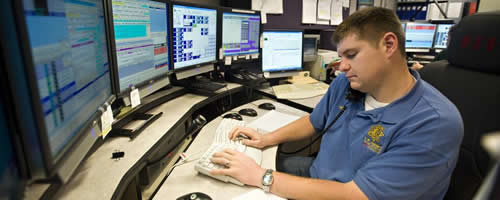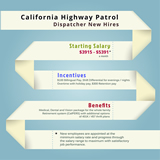EMERGENCY DISPATCHER IS A CAREER
An emergency dispatcher is a professional telecommunicator, tasked with the gathering of information related to the emergency, the provision of assistance and instructions by voice, prior to the arrival of emergency services, and the dispatching and support of those resources responding to the emergency call.
Police, fire, and emergency service dispatchers work in emergency communication centers called public safety answering points (PSAPs). Dispatchers must be available around the clock, so they often have to work evenings, weekends, and holidays. Overtime and long shifts—sometimes 12 hours—are common.

Most dispatchers are required to have a high school diploma. Managers typically have a college degree.

The median annual base wage for police, fire, and ambulance dispatchers in California was $60,000 in May 2016.

Typically dispatchers earn great benefits like health and life insurance, retirement and tuition assistance

Growth in emergency dispatching jobs are expected grow faster than the overall national average.

Occupational Benefits
- Pay. Emergency dispatching offers competitive base compensation. Oftentimes communication personnel work overtime positions, thus receiving compensation above their regular hourly rate. In addition, public service employees receive periodic pay increases that coincide with job performance and time of service.
- Benefits. As a public service position, emergency dispatchers typically receive superior benefit compensation. Benefits include medical, dental and life insurance, retirement pension programs, college tuition assistance, sick and holiday leave and generous vacation leave.
- Representation. As part of the employment agreement, most public agency personnel become contributing members of a collective group, or union, and receive collective representation.
- Mobility. Since emergency dispatcher skillsets are unique to their field and personnel requirements and position duties seldom vary from agency to agency, those wishing to relocate can easily find employment in the same professional capacity. In addition, 4 of the top 5 paying states (California, Nevada, Oregon and Washington) are located in the western region of the United States.
- Making a Difference. Emergency dispatchers experience the personal satisfaction that they made a difference in a person's lives and quite possibly contributed to the saving of a life.
- Long Term Security. Emergency dispatchers enjoy the safety and security of working in a public environment where personnel turnover as a result of layoff or downsizing is not commonplace. This is evident in the public safety area of police, fire and emergency services, where government routinely allocates a higher percentage of public funds.
- Occupation Branching. Dispatching offers a great opportunity to individuals wanting to transition to other jobs in the criminal justice, emergency service, or fire prevention sphere. Oftentimes, minimum age requirements force high school age job seekers to wait until the age of 21 before attempting to gain the position they covet. Dispatching could act as the perfect bridge position.
- You need a High School Diploma to become an Emergency Dispatcher. Entry-level positions typically require a high school diploma, or its equivalent. As a result, a job candidate can pursue an emergency dispatching career at the age of 18, rather than waiting until the age of 21, which is the minimum age requirement for many sworn positions. If you expect to advance into management positions, it is recommended that you pursue post-secondary education as a way to have access to more career advancement opportunities.

Individual Traits
- Intelligence. Emergency dispatchers are typically the focal point during chaotic situations and must manage life-or-death situations. How the emergency dispatcher handles a call for service, could mean the difference in life or death.
- Ability to Multi-Task. Emergency dispatchers must stay calm in order to simultaneously answer calls, collect vital information, coordinate responders, use mapping software and camera feeds, and assist callers.
- Communications Skills. Emergency dispatchers work with law enforcement, emergency response teams, and civilians. They must be able to communicate the nature of an emergency effectively and coordinate the appropriate response.
- Decision Making Skills. When people call for help, dispatchers must be able to quickly determine the response dictated by procedures.
- Empathy. Emergency dispatchers must be willing and able to help callers who have a wide range of needs. They must be calm, polite, and sympathetic, while also collecting relevant information quickly.
- Listening Skills. Emergency dispatchers must listen carefully to collect relevant details, even though some callers might have trouble speaking because of anxiety or stress.
- Typing Skills. Emergency dispatchers type the details of calls into computers, and speed and accuracy is of the essence when responding to emergencies.
- High Degree of Emotional Self-Control. Emergency dispatchers occasionally interact with individuals facing life threatening situations. They must always maintain a calm, strong and controlled demeanor.
- Creativity and Ingenuity. Emergency dispatchers oftentimes face unpredictable situations and their ability to manage and apply resources effectively is vital to success.
- Public Service. Emergency dispatchers should possess a strong desire to serve the community.
- Comfort with Technology. Emergency dispatchers work with the latest GPS, communication, video and audio technology. Continuous training and skill acquisition are key components of advancement within the profession.
 New dispatcher hires at California Highway Patrol (CHP) are appointed at the minimum salary rate of $3915.00 per month and progress through the salary range to maximum with satisfactory job performance. Click on the image for CHP New Dispatcher Hire benefits.
New dispatcher hires at California Highway Patrol (CHP) are appointed at the minimum salary rate of $3915.00 per month and progress through the salary range to maximum with satisfactory job performance. Click on the image for CHP New Dispatcher Hire benefits.
![]() In their job descriptions, emergency dispatchers are required to have a high school diploma, a background check and extensive classroom training. In reality, however, a dispatcher must also be part nurse, part psychologist and part diplomat.
In their job descriptions, emergency dispatchers are required to have a high school diploma, a background check and extensive classroom training. In reality, however, a dispatcher must also be part nurse, part psychologist and part diplomat.
Let us demonstrate how MindFLEX Education CTE Emergency Dispatcher curriculum can enhance your CTE program efforts. For additional information, please contact Steve Painter, Sales Department, (626) 251-0561, or visit our Product Request page.










